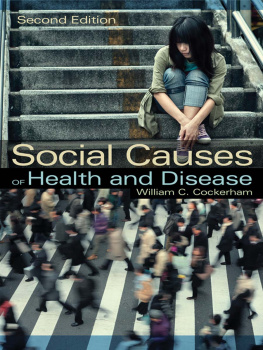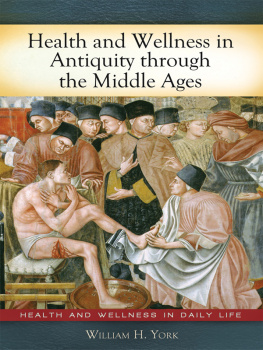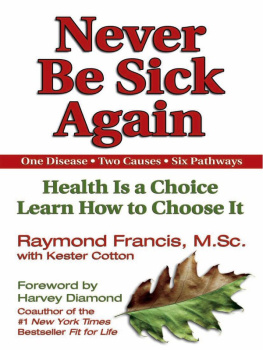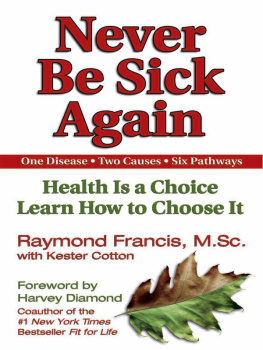Cockerham - Social Causes of Health and Disease
Here you can read online Cockerham - Social Causes of Health and Disease full text of the book (entire story) in english for free. Download pdf and epub, get meaning, cover and reviews about this ebook. City: New York, NY, year: 2014, publisher: John Wiley & Sons, genre: Politics. Description of the work, (preface) as well as reviews are available. Best literature library LitArk.com created for fans of good reading and offers a wide selection of genres:
Romance novel
Science fiction
Adventure
Detective
Science
History
Home and family
Prose
Art
Politics
Computer
Non-fiction
Religion
Business
Children
Humor
Choose a favorite category and find really read worthwhile books. Enjoy immersion in the world of imagination, feel the emotions of the characters or learn something new for yourself, make an fascinating discovery.
Social Causes of Health and Disease: summary, description and annotation
We offer to read an annotation, description, summary or preface (depends on what the author of the book "Social Causes of Health and Disease" wrote himself). If you haven't found the necessary information about the book — write in the comments, we will try to find it.
Social Causes of Health and Disease — read online for free the complete book (whole text) full work
Below is the text of the book, divided by pages. System saving the place of the last page read, allows you to conveniently read the book "Social Causes of Health and Disease" online for free, without having to search again every time where you left off. Put a bookmark, and you can go to the page where you finished reading at any time.
Font size:
Interval:
Bookmark:
Second Edition
Praise for Social Causes of Health and Disease
In this revised edition William Cockerham develops a strong and challenging case for the role of social factors in health and disease. Drawing on the latest and most important research, Social Causes of Health and Disease will stimulate debate and discussion in equal measure - essential reading for students and researchers alike. Michael Bury, Royal Holloway, University of London
This second edition of William Cockerhams acclaimed book updates his argument about the social causes of disease, drawing on the latest research from both the US and UK. His argument about the direct causal effects of social factors on health and disease is compelling and will be of considerable interest to students and researchers of both sides of the Atlantic.
Jonathan Gabe, Royal Holloway, University of London
Second Edition
William C. Cockerham
polity
For more than half a century, medical sociology has evolved as a subdiscipline of mainstream sociology. At times it was more beholden to medicine than sociology for its support, even though the field became one of the most popular sociological specialties. Time invariably brings change and medical sociology has indeed changed since its inception. For example, the old claim that medical sociology is atheoretical has been definitively quashed; there is now even a specialized journal (Health and Social Theory) on the topic. Sociological theory, in fact, has become one of the most important and distinctive research tools in the field. Moreover, medical sociology has positioned itself to provide even more precise and extensive analyses of the social aspects of health and disease. The first edition of this book represents one of the first treatises of the twenty-first century describing a new direction for research that will likely be commonplace in the not-to-distant future: the social causation of health and disease. This edition follows up on that argument. The book begins with the notion that society can make you sick and then explains the ways in which this happens.
The revised book is a further extension of a lecture I presented at the University of Montreal on a cold, grey, slushy, wet Canadian afternoon in January, 2006. This presentation was part of the universitys Alexis de Tocqueville: Questions on American Society lecture series. Arnaud Sales of the sociology department and Andre Demers of Groupe de recherche sur les aspects sociaux de la sant et de la prevention (GRASP) were wonderful hosts. In preparing for this lecture, I wanted to look forward in discussing medical sociology and focus on the future rather than the present or past. It seemed clear that the current state of theory and developments in statistics for multilevel analyses will allow medical sociologists to better assess the effects of different layers of social structure on the health of individuals. This not only forecasts a greater concern with structure in our future work, but will also permit us as a community of scholars to uncover the social mechanisms that cause health and disease. This book represents an early step in that direction.
I would like to acknowledge the assistance of several people, although the conclusions expressed are my own. Emma Longstaff , the sociology editor for Polity in Cambridge, England, provided many helpful suggestions and a high level of professionalism in her work concerning this manuscript, as did her replacement Jonathan Skerrett. Their influence led to producing a manuscript that will hopefully bridge the Atlantic as it relies heavily on both North American and British research literature. I would also like to acknowledge the contributions of Ann Bone and Belle Mundy in the production and copy-editing of the manuscript.
Mike Bury, Emeritus Professor of Sociology at Royal Holloway College London, was a stalwart critic as a reviewer for Polity on the first edition. His detailed comments helped sharpen the books thesis and he went beyond reviewing to make many cogent and thoughtful suggestions that proved to be extraordinarily helpful. I would like to additionally thank an anonymous American reviewer for her comments and reminders to make the book appealing to students. Brian Hinote and Jason Wasserman, both doctoral students in medical sociology at the University of Alabama at Birmingham, were an especially competent sounding board when working through some of the issues discussed in the first edition. Carrie Betcher was an efficient replacement for the second edition. I would like to thank Olena Hankivsky (Simon Fraser University) for a clarification and three anonymous reviewers for Polity who provided helpful comments. Ferris Ritchey and Mark LaGory, in their former positions as sociology department chairs at UAB, made sure that I had the time and support to work on the manuscript. Finally, I would like to thank my wife, Cynthia, for her continued support. Time and time again, she has proven herself to be an intelligent, insightful, and wry observer of the human social condition.
William C. Cockerham
Schopenhauers saying, that a human can very well do what he wants, but cannot will what he wants, accompanies me in all of lifes circumstances
Albert Einstein in a 1928 speech to the German League for Human Rights and repeated in his My Credo, 1932
The capability of social factors to make people ill seems to be widely recognized by the general public. Ask people if they think society can make them sick and the probabilities are high they will answer in the affirmative (Blaxter 2010). Stress, poverty, low socioeconomic status, unhealthy lifestyles, and unpleasant living and work conditions are among the many inherently social variables typically regarded by lay persons as causes of ill health. However, with the exception of stress, this view is not expressed in much of the research literature. Studies in public health, epidemiology, behavioral medicine, and other sciences in the health field typically minimize the relevance of social factors in their investigations. Usually social variables are characterized as distant or secondary influences on health and illness, not as direct causes (Link and Phelan 1995, 2000; Phelan et al. 2004). Being poor, for example, is held to produce greater exposure to something that will make a person sick, rather than bring on sickness itself. However, social variables may be more powerful in inducing adversity or enrichment in health outcomes than formerly assumed. Society may indeed make you sick or conversely, promote your health.
Font size:
Interval:
Bookmark:
Similar books «Social Causes of Health and Disease»
Look at similar books to Social Causes of Health and Disease. We have selected literature similar in name and meaning in the hope of providing readers with more options to find new, interesting, not yet read works.
Discussion, reviews of the book Social Causes of Health and Disease and just readers' own opinions. Leave your comments, write what you think about the work, its meaning or the main characters. Specify what exactly you liked and what you didn't like, and why you think so.








